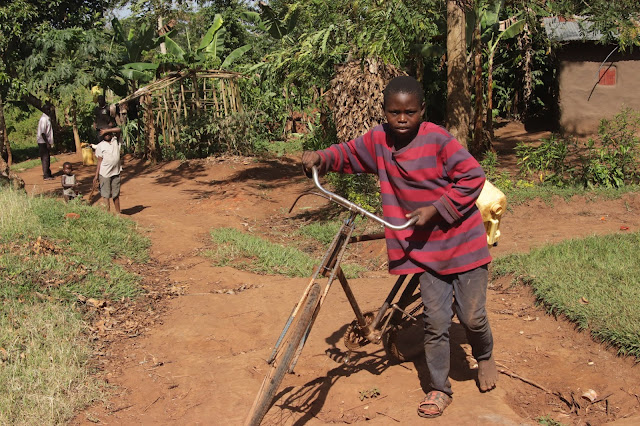Day 12 - Hunting for a cheetah in Erindi
Erindi was in an earlier life (in the 1970s and 80s) an
over-crowded livestock farm that caused a lot of damage to natural vegetation.
Owners Gert Joubert and his nephew Paul have completely extinguished the
livestock activities and re-introduced many wild species in quite large numbers
that once occurred naturally. All the
Big Five and Little Five animals are found in this 71,000 ha area. Our lodge is
located in the middle of the private park on a large natural waterhole. Upon
our arrival, the crocodiles are swimming in the water. Some choose the
waterfront.
Who is also on the waterfront is a herd of hippos.
Some seek
cooling in the water but others let themselves dry in the afternoon sun. They
remain impressive animals, the most dangerous of all. There are also a few
little ones. Those are cute to see.
In the distance a herd of elephants comes storming to the pool. Storming is
really the correct word. It's a race to be first at the water. In a huge dust
cloud they arrive at the pool.
Once the thirst is quenched, they take a mud
bath. The little ones, but also the big ones roll in the mud. It's their way to
get rid of annoying insects and parasites.
In the afternoon we go on safari. We still have some items on our wish list,
such as the endangered rhinoceros (for its good side this time) and the
difficult to find leopards and cheetahs. Namibia has the largest number of free
roaming cheetahs in Africa, but because of the high grass, it is hard to find
them. But first we are looking for lions. Some were spotted near the lodge. With
the 4X4 we go all out. Together with the driver / ranger we look under the
bushes and in the high grass, but no lion to be found. Then we start looking
for the cheetah. The cheetah is one of the hardest to find animals. Due to
their fur and low height, they are well hidden in the landscape. At this hour
they could go hunting, but also sleeping and you almost never find them. The
advantage of a private park is that you can also drive off road. In the public
parks you have to stick to the rules. We drive in the bush over low bushes,
alongside prickly trees and through the high grass. So close to the bush, you
smell the scent of Africa. This is an unbelievable moment. We look in the trees
and under the trees, because cheetah's like to lay there. After an hour, we
still have not find anything. We're joking that we might need a Bushsman to
search for tracks. In Erindi some animals are provided with a transmitter to follow
them. This way, these animals can be better monitored in an effort to maintain
the species. A guide is called who can try to find one of these cheetahs with
the antenna. The jeep comes with an antenna and ... a bushman. I will never
forget the sight of the Bushmen sitting in the front seat of the jeep in
traditional clothing with arrow and bow on his lap. He is called Cosmo and he
is sent into the bush. Bushmen are excellent trackers. We recognize the tracks
of the cheetah, but they go out to all directions. Bushmen are able to identify
the most recent ones. In the meantime, the guide with the antenna also tries to
find the cheetah, but the antenna doesn’t give any sign. We try it in different
places but nothing. We then come to the conclusion that the antenna is actually
broken. The search for the cheetah is stopped and we focus on the rhinoceros.
We have just left or we hear over the radio that Cosmo has found the cheetah. She
is laying beneath a tree that we drove passed by not that long ago, but none of
us had seen her.
With a last sundowner on this trip we end the day. Under a beautiful starry sky we drive back to our lodge.






Comments
Post a Comment